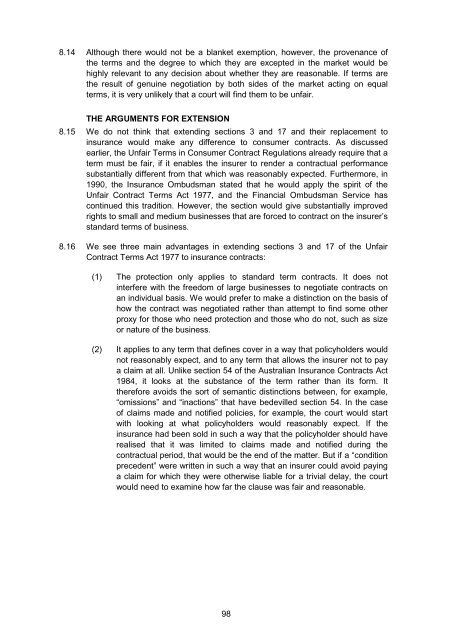Insurance Contract Law Issues Paper 2 Warranties - Law Commission
Insurance Contract Law Issues Paper 2 Warranties - Law Commission
Insurance Contract Law Issues Paper 2 Warranties - Law Commission
You also want an ePaper? Increase the reach of your titles
YUMPU automatically turns print PDFs into web optimized ePapers that Google loves.
8.14 Although there would not be a blanket exemption, however, the provenance of<br />
the terms and the degree to which they are excepted in the market would be<br />
highly relevant to any decision about whether they are reasonable. If terms are<br />
the result of genuine negotiation by both sides of the market acting on equal<br />
terms, it is very unlikely that a court will find them to be unfair.<br />
THE ARGUMENTS FOR EXTENSION<br />
8.15 We do not think that extending sections 3 and 17 and their replacement to<br />
insurance would make any difference to consumer contracts. As discussed<br />
earlier, the Unfair Terms in Consumer <strong>Contract</strong> Regulations already require that a<br />
term must be fair, if it enables the insurer to render a contractual performance<br />
substantially different from that which was reasonably expected. Furthermore, in<br />
1990, the <strong>Insurance</strong> Ombudsman stated that he would apply the spirit of the<br />
Unfair <strong>Contract</strong> Terms Act 1977, and the Financial Ombudsman Service has<br />
continued this tradition. However, the section would give substantially improved<br />
rights to small and medium businesses that are forced to contract on the insurer’s<br />
standard terms of business.<br />
8.16 We see three main advantages in extending sections 3 and 17 of the Unfair<br />
<strong>Contract</strong> Terms Act 1977 to insurance contracts:<br />
(1) The protection only applies to standard term contracts. It does not<br />
interfere with the freedom of large businesses to negotiate contracts on<br />
an individual basis. We would prefer to make a distinction on the basis of<br />
how the contract was negotiated rather than attempt to find some other<br />
proxy for those who need protection and those who do not, such as size<br />
or nature of the business.<br />
(2) It applies to any term that defines cover in a way that policyholders would<br />
not reasonably expect, and to any term that allows the insurer not to pay<br />
a claim at all. Unlike section 54 of the Australian <strong>Insurance</strong> <strong>Contract</strong>s Act<br />
1984, it looks at the substance of the term rather than its form. It<br />
therefore avoids the sort of semantic distinctions between, for example,<br />
“omissions” and “inactions” that have bedevilled section 54. In the case<br />
of claims made and notified policies, for example, the court would start<br />
with looking at what policyholders would reasonably expect. If the<br />
insurance had been sold in such a way that the policyholder should have<br />
realised that it was limited to claims made and notified during the<br />
contractual period, that would be the end of the matter. But if a “condition<br />
precedent” were written in such a way that an insurer could avoid paying<br />
a claim for which they were otherwise liable for a trivial delay, the court<br />
would need to examine how far the clause was fair and reasonable.<br />
98

















